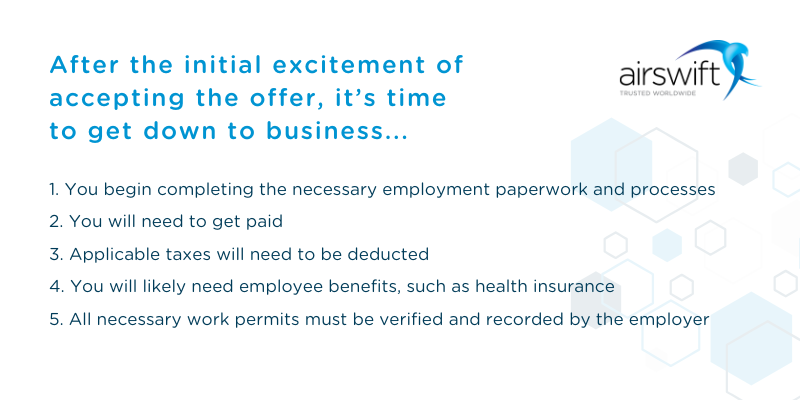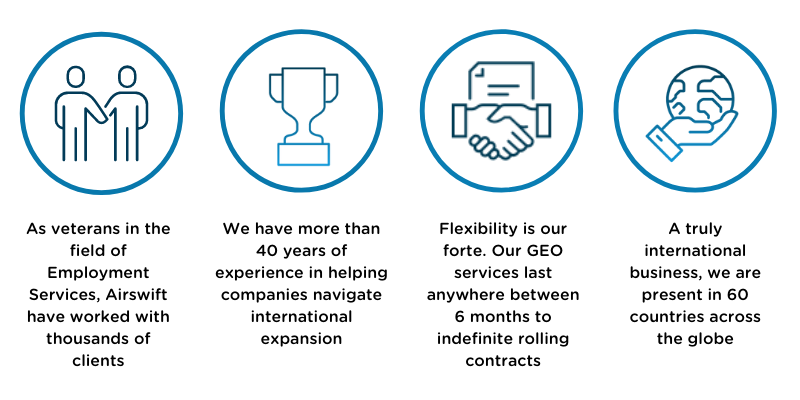
By
Alicia Edwards
February 11, 2025
Updated
February 11, 2025
An Employer of Record (EOR) is a third-party organisation that helps businesses legally employ workers in other countries. The EOR becomes legally responsible for managing all aspects related to the employment of a worker, including payroll, benefits, taxes and labour law compliance.
How can an EOR be used by businesses?
An Employer of Record can be used by businesses to hire international workers and access a wider talent pool without bringing them onto their payroll. This is especially useful for businesses that want to expand into foreign locations or want to quickly grow their workforce without the administrative burden of hiring and managing their employees directly.
Why should you partner with an EOR?
By partnering with an EOR, the organisation has the freedom to focus on the core aspects of its business growth while the Employer of Record handles all of its administrative responsibilities.
Think about the jobs you’ve been hired for in the past.

Human Resources typically manage this piece of the employee onboarding process. However, in many cases, companies choose to outsource this function to an Employer of Record.
Why or when would a company use Employer of Record services?
An EOR is often used for global expansion when a company plans to conduct business activity in a new country without a physical entity.
The process of registering a local business entity can be expensive and arduous. The company may need to move swiftly in order to meet the needs of a project or new business venture. Or they only require a short-term solution.
Thus, a global Employer of Record can be an efficient way to hire workers in that country. The EOR will have a legal entity to manage local payroll, employment tasks and immigration. The EOR will also appear as the legal employer for your remote employees in the host country.
What are some of the core employment tasks an EOR undertakes on behalf of a company?
- Sponsoring correct visas and work permits
- Ensuring all international expansion and hiring plans are compliant with local regulations
- Providing a local legal entity within the host country
- Employee compensation and benefit management
- Employee relocation services
- Employee notice period and contract termination procedures

What are the pros and cons of working with an Employer of Record company?
Pros |
Cons |
Speed up your market penetration strategy |
Could blur the lines of responsibility |
Increased convenience |
Relinquished payroll control |
Cost-effective |
Changing service terms |
Minimised risk |
Cultural misalignment |
Some advantages of an EOR:
1. Speed up your market penetration strategy
Companies can ramp up operations faster than incorporating a foreign entity in the country without running any compliance risks. An Employer of Record can get you up and running in a new location in as little as 48 hours by appearing as the legal employer of your international hire. This allows organisations to hire the best global talent and leverage new market opportunities as soon as they surface.
2. Increased convenience
Airswift’s Employer of Record solutions provide companies with flexibility. Businesses can test new markets or engage in short-term projects without setting up a physical foreign entity. This is especially helpful for smaller companies that don’t have the corporate infrastructure required to handle local payroll, immigration, and tax requirements.
An EOR provides a company with a legal entity that can handle all these commitments. They also have the expertise needed to ensure the company is fully compliant with any international employment laws and regulations of their host country.
3. Cost-effective
An Employer of Record allows companies to bypass the overhead costs that often come with setting up and maintaining an entity in a foreign location. From sourcing international talent keeping compliant employment contracts, an Employer of Record lets businesses restructure their cash flow and allocate these resources towards escalating their growth plans.
Using an EOR is also a convenient and cost-effective option for smaller companies, especially firms without the corporate infrastructure to manage local payroll, payroll taxes and immigration.
4. Minimise risk
An Employer of Record helps to assume responsibility for the liabilities that come with hiring and operating internationally. Human resources issues relating to employee benefits, payroll and taxation, administrative operations and legal compliance are taken on by the EOR.
Protecting companies from the risks involved in mishandling these matters. Working with competent and experienced EOR service providers gives clients peace of mind that these responsibilities are being properly managed.
Some disadvantages of EOR:
1. Could blur the lines of responsibility
The legal employment relationship will exist between the employee and the EOR. But the EOR has no dealings with the employee around daily work responsibilities. This direction comes from the original employer. Thus, the lines of responsibility can become somewhat “blurred” when using an EOR.
2. Relinquished payroll control
As the employment relationship is technically between the employee and the EOR, the original employer essentially gives up control over the payroll process. This might cause confusion if the company pays employees bi-weekly and the host country dictates monthly payments. In this instance, the international employee is paid through the EOR according to the host country’s laws and NOT the company’s payroll process.
3. Changing service terms
If the EOR changes their service terms, prices, or quality, companies might find it challenging to adapt quickly or switch providers without disrupting their operations.
4. Cultural misalignment
An EOR might not fully grasp or align with the client company’s cultural values or operational practices, potentially leading to a mismatch in employee management styles and company culture.
What are the alternatives?
Should I use a PEO or EOR?
One alternative would be to use a Professional Employer Organisation or a PEO. The key difference is that a PEO does not hold the employment relationship and associated risk as an EOR would.
Instead, a PEO provides guidance on payroll service, registration and compliance needs. This may include connecting a company with an Employer of Record. This would involve the company managing relationships with both the PEO and the EOR.
Contractors or EOR?
Another alternative would be to hire contractors to carry out in-country operations. Although, for long-term assignments, this might not be the best alternative. Contractors, by the very nature of the work they’ve chosen, may be more likely to change jobs frequently.
Employer of Record or a staffing agency?
There is some crossover in the services provided by an employer of record and a staffing agency. Both will manage the temporary deployment of personnel for a client company.
However, many staffing agencies do not have the specialist in-house expertise to manage global employment contracts, laws and regulations.
Is it easier to register an entity in-country?
A company can always opt to register an entity in-country. This process is a viable situation if funding and timescales allow. It is also an effective approach if you are planning a long-term, permanent base in-country.
If you need a temporary solution while registering an entity, an EOR can be valuable. In countries with long registration periods, the EOR could temporarily assume responsibility for international employment. This can be an effective way to save time and money.
They would then transition back to the client company once an entity is established.
Simplify your global business expansion with Airswift's Employer of Record
Our EOR services are available in over 60 locations. Airswift helps to employ and manage an international workforce on behalf of our clients. Ensuring all procedures are handled by dedicated teams in-house without having to rely on third-party providers.
 Immigration support
Immigration support
Understanding the laws that govern immigration processes is a daunting aspect of international hiring. Airswift works with international employees to help get the correct visas and permits for their new work location.
Location-specific employee support
We live in the countries we work in. This means that we have a designated team of Airswift staff who can regularly check-in with a client’s new hire. Our local service teams are available to answer all queries that may arise from clients and workers.
Accurate payroll management
Payroll procedures vary according to country. Airswift provides payroll services that abide by local regulations. We assist clients in managing all aspects of payroll processing, from setting up a local bank account to tax payments and worker compensation.
De-mobilisation services
When a worker’s employment contract ends or if either party decides to terminate the employment. Airswift can support tax clearance, immigration cancellation and end-of-lease arrangements. We also help with bank account closure and organise return travel.
If you are expanding your business operations internationally, Airswift can help. Our Employer of Record services cover a wide range of essentials that can be customised to your needs. Some of our core services include outsourcing payroll management, ensuring compliance with labour laws, tax filing and work visa sponsorships.
We are a truly global business with a local approach to innovative employee solutions. We don't just work in the countries we operate in - we live there.

